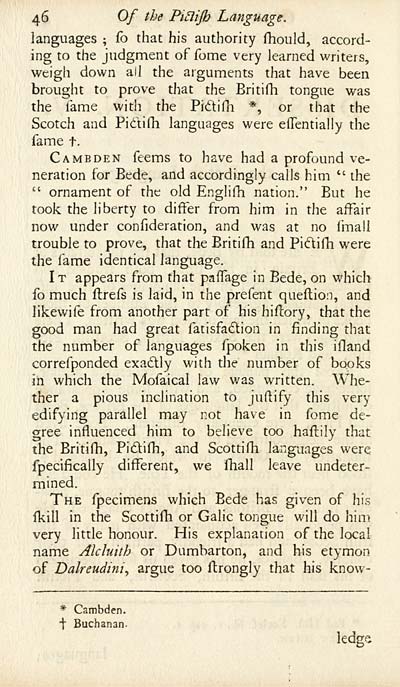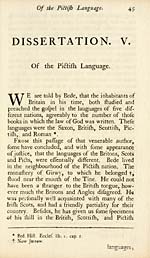Blair Collection > Critical dissertations on the origin, antiquities, language, government, manners, and religion, of the antient Caledonians, their posterity the Picts, and the British and Irish Scots
(84)
Download files
Complete book:
Individual page:
Thumbnail gallery: Grid view | List view

46 Of the Pinijh Language.
languages ; fo that his authority fhould, accord-
ing to the judgment of fome very learned writers,
weigh down all the arguments that have been
brought to prove that the Britifh tongue was
the fame with the Pidifh *, or that the
Scotch and Pidtifh languages were effentially the
fame f.
Came DEN feems to have had a profound ve-
neration for Bede, and accordingly calls him " the
" ornament of the old Englifh nation." But he
took the liberty to differ from him in the affair
now under confideration, and was at no fmall
trouble to prove, that the Britifh and Pidifh were
the fame identical language.
It appears from that paffage in Bede, on which
fo much ftrefs is laid, in the prefent queflion, and
likewife from another part of his hiflory, that the
good man had great fatisfadlion in finding that
the number of languages fpoken in this ifland
correfponded exadly with the number of books
in which the Mofaical law was written. Whe-
ther a pious inclination to juflify this very
edifying parallel may not have in fome de-
gree influenced him to believe too haffily that
the Britifh, Pidifh, and Scottifh kxnguages were
fpecifically different, we fhall leave undeter-
mined.
The fpecimens which Bede has given of his
fkill in the Scottifh or Galic tongue will do him
very little honour. His explanation of the local
name Alcluith or Dumbarton, and his etymon
of Dalreudini., argue too ftrongly that his know-
* Cambden.
t Buchanan.
ledge
languages ; fo that his authority fhould, accord-
ing to the judgment of fome very learned writers,
weigh down all the arguments that have been
brought to prove that the Britifh tongue was
the fame with the Pidifh *, or that the
Scotch and Pidtifh languages were effentially the
fame f.
Came DEN feems to have had a profound ve-
neration for Bede, and accordingly calls him " the
" ornament of the old Englifh nation." But he
took the liberty to differ from him in the affair
now under confideration, and was at no fmall
trouble to prove, that the Britifh and Pidifh were
the fame identical language.
It appears from that paffage in Bede, on which
fo much ftrefs is laid, in the prefent queflion, and
likewife from another part of his hiflory, that the
good man had great fatisfadlion in finding that
the number of languages fpoken in this ifland
correfponded exadly with the number of books
in which the Mofaical law was written. Whe-
ther a pious inclination to juflify this very
edifying parallel may not have in fome de-
gree influenced him to believe too haffily that
the Britifh, Pidifh, and Scottifh kxnguages were
fpecifically different, we fhall leave undeter-
mined.
The fpecimens which Bede has given of his
fkill in the Scottifh or Galic tongue will do him
very little honour. His explanation of the local
name Alcluith or Dumbarton, and his etymon
of Dalreudini., argue too ftrongly that his know-
* Cambden.
t Buchanan.
ledge
Set display mode to: Large image | Transcription
Images and transcriptions on this page, including medium image downloads, may be used under the Creative Commons Attribution 4.0 International Licence unless otherwise stated. ![]()
| Permanent URL | https://digital.nls.uk/76287535 |
|---|
| Description | A selection of books from a collection of more than 500 titles, mostly on religious and literary topics. Also includes some material dealing with other Celtic languages and societies. Collection created towards the end of the 19th century by Lady Evelyn Stewart Murray. |
|---|
| Description | Selected items from five 'Special and Named Printed Collections'. Includes books in Gaelic and other Celtic languages, works about the Gaels, their languages, literature, culture and history. |
|---|

